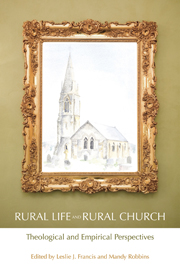Book contents
- Frontmatter
- Contents
- Preface
- Foreword by The Bishop of Shrewsbury, The Rt Revd Mark Rylands
- 1 Introduction: shaping rural theology
- PART 1 PERSPECTIVES FROM THE BIBLE
- PART 2 PERSPECTIVES FROM ORDINARY THEOLOGY
- PART 3 THEOLOGICAL AND SOCIOLOGICAL PERSPECTIVES
- PART 4 HISTORICAL PERSPECTIVES
- PART 5 LISTENING TO VISITORS
- PART 6 LISTENING TO THE COMMUNITY
- PART 7 LISTENING TO CHURCHGOERS
- 21 All types are called, but some are more likely to respond: the Psychological type profile of rural Anglican churchgoers in Wales
- 22 The social significance of Harvest Festivals in the countryside: an empirical enquiry among those who attend
- 23 Psychological type profile of volunteer workers in a rural Christian charity shop
- PART 8 LISTENING TO CHURCH LEADERS
- PART 9 SATISFACTION AND STRESS IN MINISTRY
- Contributors
- Sources
- Subject Index
- Name Index
21 - All types are called, but some are more likely to respond: the Psychological type profile of rural Anglican churchgoers in Wales
from PART 7 - LISTENING TO CHURCHGOERS
- Frontmatter
- Contents
- Preface
- Foreword by The Bishop of Shrewsbury, The Rt Revd Mark Rylands
- 1 Introduction: shaping rural theology
- PART 1 PERSPECTIVES FROM THE BIBLE
- PART 2 PERSPECTIVES FROM ORDINARY THEOLOGY
- PART 3 THEOLOGICAL AND SOCIOLOGICAL PERSPECTIVES
- PART 4 HISTORICAL PERSPECTIVES
- PART 5 LISTENING TO VISITORS
- PART 6 LISTENING TO THE COMMUNITY
- PART 7 LISTENING TO CHURCHGOERS
- 21 All types are called, but some are more likely to respond: the Psychological type profile of rural Anglican churchgoers in Wales
- 22 The social significance of Harvest Festivals in the countryside: an empirical enquiry among those who attend
- 23 Psychological type profile of volunteer workers in a rural Christian charity shop
- PART 8 LISTENING TO CHURCH LEADERS
- PART 9 SATISFACTION AND STRESS IN MINISTRY
- Contributors
- Sources
- Subject Index
- Name Index
Summary
Abstract – In principle churches proclaim their invitation to worship to all sectors of the population. In practice some sectors appear more willing to respond. Alongside the more visible demographic bias in terms of sex and age, this article draws attention to the less visible bias in terms of psychological type. New data provided by 185 rural Anglican church-goers who completed the Francis Psychological Type Scales demonstrated that there were significantly higher proportions of individuals reporting IS FJ and ES FJ preferences in church congregations than in the population of men and women at large.
Introduction
The invitation ‘Everybody Welcome’ remains a worthy and laudable theological aspiration for the notice board of rural Anglican churches. The inclusivity of the welcome is a proper reflection of the Great Commission recorded in Matthew 28:19-20. This inclusivity is also a proper reflection of the potential for the rural parish church to function as a community church rather than an associational church. On this account, a wide variety of people are likely to go to the rural parish church largely because they live in (belong to) the area rather than because they choose to associate with (belong to) a particular network of people.
This worthy and laudable theological aspiration, however, may be challenged by a range of empirical evidence. Analyses of the demographic profile of many congregations provide a highly visible challenge in terms of sex and age (see Francis, 1996). The breakdown by sex tends to demonstrate that there are two female churchgoers for every one male churchgoer. The proclamation is clearly made that men and women are equally welcome, but women are twice as likely to respond. Then it may become increasingly difficult for men to feel at home in an environment shaped largely by women for women.
- Type
- Chapter
- Information
- Rural Life and Rural ChurchTheological and Empirical Perspectives, pp. 258 - 265Publisher: Acumen PublishingPrint publication year: 2012



